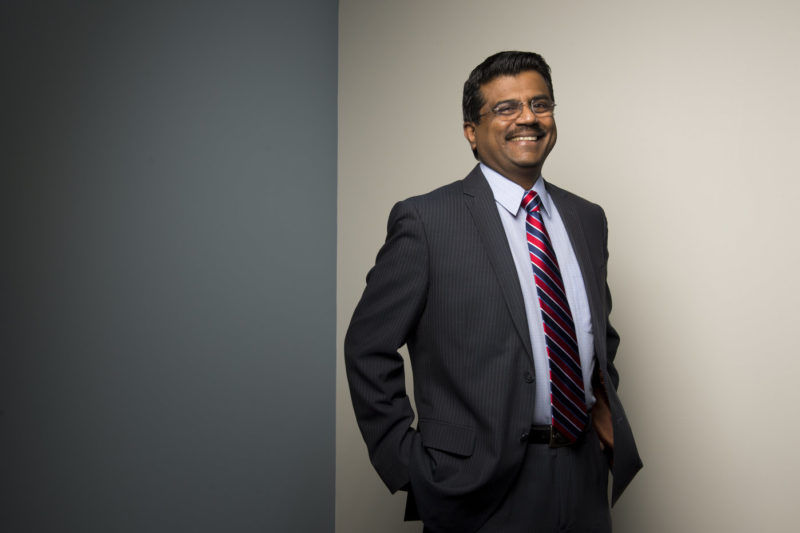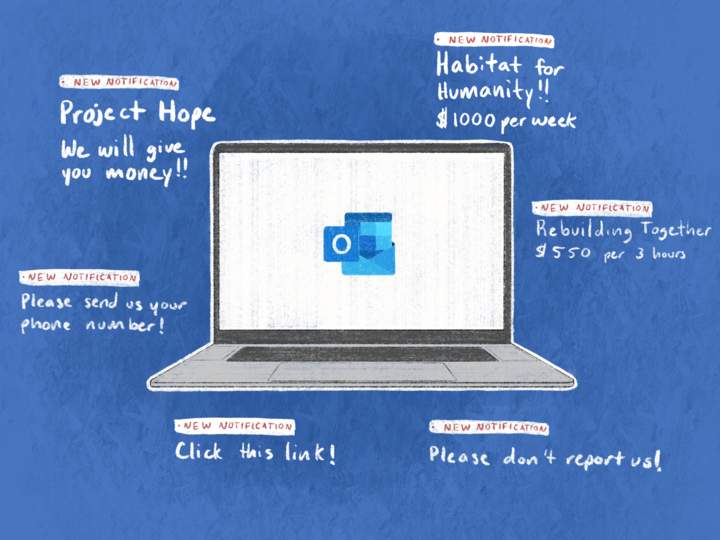COVID-19 creates ‘opportunities and challenges’ for Northeastern admissions, says NU’s VP of Enrollment Management
Photo courtesy News@Northeastern
“The pandemic gives us a lot of challenges and a lot of opportunities to serve the students and to also think about engaging and supporting students’ needs differently,” Northeastern’s Vice President of Enrollment Management Sundar Kumarasamy said.
July 23, 2020
The impacts of the coronavirus pandemic have been felt strongly throughout Northeastern, with every department facing unique challenges. In the office of admissions, staff face the challenge of ensuring that applying to Northeastern is an accessible process for all future students, especially during a time rife with inequities.
With SAT and ACT exams canceled, campus visits virtualized and heavy financial burdens placed on many families, high school students and incoming college first-years have been put in an unprecedented position.
In an interview with The News last week, Northeastern’s Vice President of Enrollment Management Sundar Kumarasamy said the university is exploring different ways to allow Northeastern applicants to “engage, experience and express their abilities, talents and aspirations.”
“The pandemic gives us a lot of challenges and a lot of opportunities to serve the students and to also think about engaging and supporting students’ needs differently,” Kumarasamy said.
In April, Northeastern made one of its first admissions changes, dropping the standardized test requirement for the 2021-22 applicants, following universities across the country.
Northeastern made this decision in light of students’ increased stress level, lack of access to tests and external pressures, Kumarasamy said.
“Right now, high school students cannot take [standardized tests] multiple times, not even a single time in some cases. But they are also under a high stress and may not be able to fully perform at the same level,” he said. “That’s one of the reasons why we decided to make it test optional. Some of the students might have been well prepared, but we don’t want to make the student who has not had the time and opportunity to showcase [their abilities] through tests not have the opportunity to demonstrate their ability through other means to us.”
Kumarasamy said this is a temporary change, but they are exploring all possibilities for the future.
“We don’t have to make a decision today. Rather, we should see this as a learning experience for us,” he said. “So at this point in time, we are addressing an acute problem that happened, and we take that as an opportunity to give the flexibility to personalize and customize the application process.”
Kumarasamy said the new test-optional policy opens up many doors and could help with other university goals, such as President Joseph E. Aoun’s goal for Northeastern to reflect the diversity of the United States by 2025.
“There is no doubt that this kind of flexibility may advantage any segment of students … Any kind of standardized test we know creates compression based on many social factors. We believe [the test-optional policy] will give us a genuine opportunity to learn how we can assess and support students without those kind of indicators in the mix.”
Kumarasamy emphasized the holistic approach the university takes to admissions and that, even when standardized tests were required, they were only one factor of a larger picture that includes essays, transcripts, extracurriculars, portfolios and more.
Another new option the university has introduced is challenge exams, “assessments [that] allow entering first-year students to place out of some introductory courses, much like the AP exam, or International Baccalaureate (IB) or transfer credit currently allow.”
Due to the many obstacles students taking AP exams faced this year, the university introduced challenge exams as a way for students to place out of certain introductory courses, such as First-Year Writing, General Physics and Foundations of Psychology.
Over 2,000 incoming first-years have requested challenge exams, Kumarasamy said. The AP exam challenges allowed the university to “innovate and introduce something significant,” he said. “These are the kind of new opportunities and new paradigms we will be able to create and leverage.”
Going into the new application cycle, Kumarasamy said the admissions department is continually thinking of new ways to engage students and get them excited about Northeastern.
“[All universities] are not in the same boat. We are all different boats facing the same storm … We are mindfully looking at, ‘How do we engage [prospective students] consistently but virtually in a meaningful way?’” he said. “Their experiences with Northeastern should be unique — no other school in the country will be able to allow them to have that engagement.”
Northeastern must continue to be the leader in innovative education, he said.
“Northeastern is about creating the flexibility to personalize and customize their education, meaning anytime, anywhere and anything they want to learn. This is not going to be born by sitting in a classroom or sitting in a workplace for co-op. Learning takes place in multiple places at multiple times.”
Kumarasamy said he believes this period of time is not a “new normal,” as one hears so frequently, but a “new abnormal.”
“What we are going through right now is not what it is going to be in the future, but what we know for sure is that it is going to open up many new opportunities, how we engage and see this as a global society, because for the first time, the entire world is experiencing the same thing,” Kumarasamy said.
Deanna Schwartz can be reached at d.schwartz@huntnewsnu.com and @deannaschwartzz on Twitter.







